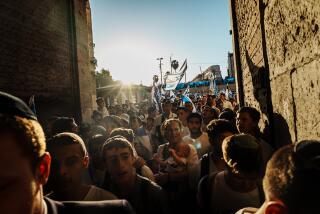Thousands join in nationalist, anti-migrant marches in Russia
- Share via
MOSCOW -- Thousands of right-wing nationalists marched in cities and towns throughout Russia on Monday, demanding the eviction of migrants, as the nation observed the day officially designated as National Unity Day.
In Moscow, about 8,500 people marched under pouring rain for about two miles through a southeast suburb, brandishing a mix of symbols that included the Russian Imperial flag and banners featuring neo-fascist emblems that resembled swastikas.
Columns of young men dressed in sports slacks, black hooded jackets, black woolen hats, sunglasses and masks chanted slogans that included: “Nationalism is Russia’s choice,” “Russia is for Russians,” “The white race is a clean race” and even “Sieg heil,” the World War II-era Nazi salute.
The Soviet Union, which included Russia, lost as many as 30 million people fighting Nazi Germany.
At one end of the march, protesters bellowed, “Long live Stalin and Lenin!” At the other end, some chanted that they would hang all communists.
Other marches took place in St. Petersburg, Volgograd and Irkutsk, among other places.
National Unity Day was introduced by Russian leader Vladimir Putin in 2004 in what was seen as an effort to deprive Russian communists and other leftists of a beloved Soviet-era holiday, the anniversary of the October 1917 Bolshevik revolution, celebrated for decades on Nov. 7.
From the start, the new holiday was hijacked by Russian nationalists, who spanned a spectrum from moderates to neo-Nazis. Unity Day marches have since become an annual occurrence.
Alexander Belov, one of the march organizers, downplayed the more extreme rhetoric, saying it simply reflected the immaturity of some teenage marchers.
More significant, he said, was a huge banner carried by marchers that read: “For Biryulyovo.”
It referred to a Moscow suburb shaken by riots last month after a young, ethnic Russian man was killed, allegedly by a migrant worker from neighboring Azerbaijan. In response, hundreds of nationalist youth vandalized and looted shops and kiosks run by non-Russians, overturned and burned cars and tried to storm a vegetable market before police stopped them. The following day, a migrant worker from Uzbekistan was knifed to death in the area.
In response, police detained thousands of migrant workers and closed down the local market run by people from the North Caucasus region.
“Things like recent riots in Biryulyovo keep happening with increasing frequency all over Russia and demonstrate a natural reaction of our young and not-so-young people to the immense overflow of both legal and illegal migrants,” said Belov, leader of the ethno-political movement Russkiye, in an interview.
“These are uncivilized people who come down from their mountains and commit crimes here, from drug trafficking to murders and rapes on a mass scale,” he continued. “This is why our people are so full of indignation and they join our marches all over the country. We are marching today for our Russian identity and against Russia turning into a cosmopolitan garbage dump.”
One young man, with a soccer team scarf around his neck, carried a poster showing a mosque crossed out by a thick red line. He insisted that he and his friends would hunt down people from Caucasus and Central Asia “if Putin doesn’t remove them from our streets.”
“They have no business to be here,” said the 16-year-old, who introduced himself only as Andrei. “It’s time Russia should stop feeding the Caucasus. We need to build a huge fence on the border and leave them there to their own devices.”
Despite striking differences, the march had one element in common with that of a liberal opposition march in Moscow last month -- the slogan “Russia without Putin,” repeated over and over.
Lilia Shevtsova, a prominent political analyst, said the Kremlin had encouraged the growth of nationalism but that nationalists now were emerging as a new and dangerous enemy.
“Despite still being largely split and fragmented, Russian nationalism is growing to become very anti-Kremlin and pointedly anti-Putin,” Shevtsova, a senior researcher at the Moscow Carnegie Center, said in an interview. “The Kremlin was working hard to prevent any unity between moderate nationalists and liberal democrats and, in the act, overlooked a fast-growing threat of extreme nationalism.”
The Moscow march ended in a rock concert by the openly anti-Semitic, nationalist rock band Kolovrat, which is known for a song celebrating Adolf Hitler, who “wanted to free Russia from … Zionist scum.”
ALSO:
Egypt: Morsi trial delayed after chaotic start
Iran: Thousands rally against U.S. on hostage anniversary
Toronto mayor admits getting ‘hammered,’ deflects drug reports
More to Read
Sign up for Essential California
The most important California stories and recommendations in your inbox every morning.
You may occasionally receive promotional content from the Los Angeles Times.










